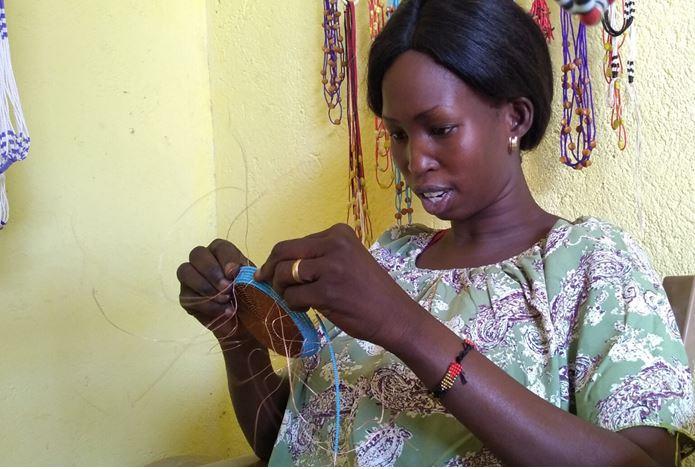Africa-Press – South-Sudan. At 31 years, Ifon Phillip, has trodden the path of creativity and found her bearings on what is likely to unlock her success in earning a living from art.
She used to work in the embroidery industry, selling her wares in local markets and at home, until she discovered a new love for beading.A mother of four realised how beads could help her sell her talent not only locally but also internationally.
Her hands are constantly moving as she works on a blue and brown bracelet that mixes her traditional beading skills with her newly acquired knowledge of international markets. As a result of beading for worldwide markets, her home and her sense of self have changed completely.
“Beads are worn by about 25 tribes in South Sudan,” she explains. “We have two different sorts of Dinka corsets. One is worn by males, while the other is worn by females. Some of the corsets are worn by married ladies, while others are worn by unmarried women.”
“Ajoh beads are worn by both men and women, and triplet ajoh beads are worn by married ladies.”
Chokers, bracelets, and calabashes are also made by the Roots’ women.
She has improved her beading abilities, and her items feature about 25 different South Sudanese ethnicities.
“The project is solely focused on beads. We began making South Sudanese ethnic beads, which feature about 25 tribes, “she explains.“We started with traditional beads and then moved on to contemporary beads in South Sudan.”
Ifon is a bead enthusiast, “I was one of the first women in South Sudan to be chosen by the founder of the Roots Project to create beads.”
Anyieth D’Awol is the director and founder of the Roots Projects and has a love for promoting South Sudanese culture.
Ifon said she was one of the first ladies to join the Roots Project, which is beading-oriented.Large market
The United States, the United Kingdom, and China are now the top three buyers of the locally-made beads of all the foreign nationals working for international organisations in South Sudan.
“When we first started the business in 2009, it was only here in South Sudan, and most of these international bodies, like the international NGOs, people working for these NGOs would come and buy it and take it back to their countries, and then we gradually opened shops in the United States, specifically in Seattle.”The Roots intend to sell their merchandise on a few flights as well.
“We export some of the products to Japan, and we manufactured bracelets for Chinese New Year three months ago,” she explained. We’re collaborating with Virgin Atlanta Airlines, and our products will be available on their website.”
Ifon believes that beading for the foreign market provides limitless prospects for South Sudanese beaders. However, she said there are still some significant obstacles to breaking into African and other overseas markets.
“We would love to trade within Africa because there is a large market opportunity, but we are still looking for opportunities to export our products,” she explained. “Some of the tribes here in Africa, such as South Africa and Ethiopia, have a lot of beads but our beads are unique,” she added.
“The colours we chose to make these bracelets, necklaces, and chokers are lovely, and we believe that if they are sold in Africa, people will go crazy for them,” she explained.
One of the issues Ifon is now facing is the limited market for South Sudanese bead products. The Roots operate a market in Santa Fe where they sell their wares.
“Getting a market in Europe is difficult since we are in South Sudan, and we lack exposure, but if there is enough exposure even in Africa, we will be able to sell our products.”Another issue is a lack of funds to purchase first-class beads from countries like the United States, the United Kingdom, and the Czech Republic.
“We have third-quality beads here in South Sudan. If we can bring first-quality beads, we will be able to manufacture classier things.”
For the time being, Roots is paying Dalsey Hillblom Lynn. a branch of German logistics company Deutsche Post (DHL) which offers international shipping, parcel, courier and express mail services. Ifon’s products are shipped by DHL to markets in the United States and the United Kingdom, which is excessively expensive for Ifon.Aside from the challenges of a lack of a proper market and the cost of shipping the beads internationally, Philip stated that COVID-19 had an impact on her work and the work of the other elderly women who helped make the beads for the root projects.
“The COVID-19 session has disappointed us. We were not able to work with the women who used to do the beadings due to the COVID-19 measures.”
“We were not able to sell our beads because markets were closed to the public, so it was very challenging for us. We could not even sell our products, be it in Juba or the US, because the world was shut down,” Ifon said.
She said for the last two years she had gone through difficulties, even paying some of the women who have been working with the roots due to the COVID-19 situation, which has not been easy.
Ifon promised not to give up on the beading work. She feels that with financial backing, South Sudanese beads may have a bigger fashion impact on the international stage.
For More News And Analysis About South-Sudan Follow Africa-Press






